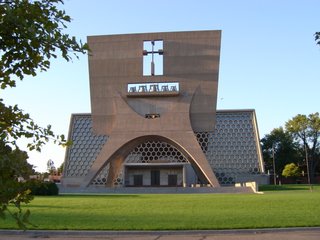A Sabbatical Begins
 Yesterday I arrived mid-afternoon in Collegeville, MN, to spend the fall term as Scholar-in-Residence at the Institute for Ecumenical and Cultural Research located at St. John's University. Pictured here is the Abbey church where I intend to say Morning, and sometimes Evening, Prayers with the large group of Benedictine monastics.
Yesterday I arrived mid-afternoon in Collegeville, MN, to spend the fall term as Scholar-in-Residence at the Institute for Ecumenical and Cultural Research located at St. John's University. Pictured here is the Abbey church where I intend to say Morning, and sometimes Evening, Prayers with the large group of Benedictine monastics.The photo is taken from in front of the Alcuin library where I will spend much of my time doing research and writing on the Elizabethan Homilies of 1563 and their role in spiritual formation. I have committed to one major lecture, am working on two papers for presentation, an article, and a book proposal. Our group of eight sabbaticants meets once a week on Tuesday afternoons to share what we are discovering and writing. We are made up of four Roman Catholics and four Protestants of eclectic variety. Needless to say, I am the only Free Methodist.
Two scholarly interests have brought me here: liturgical reform and ecumenical dialogue. But, what attracted me most was the opportunity to engage in the regular rhythm of prayer with the monastic community. We began Morning Prayer at 7 a.m. today with these familiar words from Psalm 63: "O God, you are my God, for you I long; for you my soul is thirsting. My body pines for you like a dry, wearly land without water. So I gaze on you in the sanctuary to see your strength and your glory."
On the flight to Minneapolis yesterday, I was reading a piece by Lancelot Andrewes (1555-1626) entitled, "The Pattern of Catechistical Doctrine at Large," in which he asserts that there are three parts to our Invocation to God--Deprecation, Precation, and Intercession. As I begin this journey of prayer and study I begin with the need for deprecation--that the dross that weighs one down might be removed. There is a need for purgation, of sorts. Second, I lay hold of the second branch, Precation, and desire that God would renew and strengthen me. And I close by remembering those of you who are reading this from Greenville and in other places, praying that God would give you hope as you bear whatever cross weighs you down this day.


<< Home